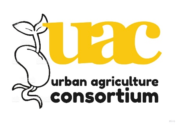Urban Agriculture Consortium
“Citizens want ambitious action for greener, healthier, fairer food and farming… *”
The Urban Agriculture Consortium (UAC) has been working with partners across the UK to explore and promote new ideas and practical solutions which will amplify and accelerate the development of nature-friendly food growing in urban and peri-urban areas.
The innovative projects and collaborations UAC has supported are detailed here.
Emerging work on, for example, Reimagining the Greenbelt, and Landed Community Kitchens indicates our direction of travel – funding permitting.
In 2024 there is a growing consensus that the current food system needs radical change to adapt to climate change, and to address many issues around food security and food justice. We support calls for “… a comprehensive and coherent suite of food policies to improve public health, boost farm resilience and protect nature and the environment…”*
We are planning a further PING meeting for 14 November 2024 which will celebrate our work to date, and explore emerging strands of work which may have the most impact in the future development of urban and peri-urban food growing in the coming decade. We’d like to produce a co-designed “Manifesto for Urban Agriculture” which can be adopted and delivered by any of our wide range of partners. More details soon.
If you’d like to support us, please get in touch!
* from The Hope Farm Statement, May 2024
PING #11 -Future of Urban Agroecolgy – now 21 November
Thursday 21 November, 10.00-12.30. Join us for this free online consultation where we’ll be curating…
National Planning Policy Framework
UAC’s succinct submission was sent to the NPPF consultation on 24 September. Irrespective of where…
NEW DATE – Future of Urban Agroecolgy – now 21 November
NEW DATE: 21 November 2024 timing bewtween 10.00-13.00 tbc. We are busy planning our next…
